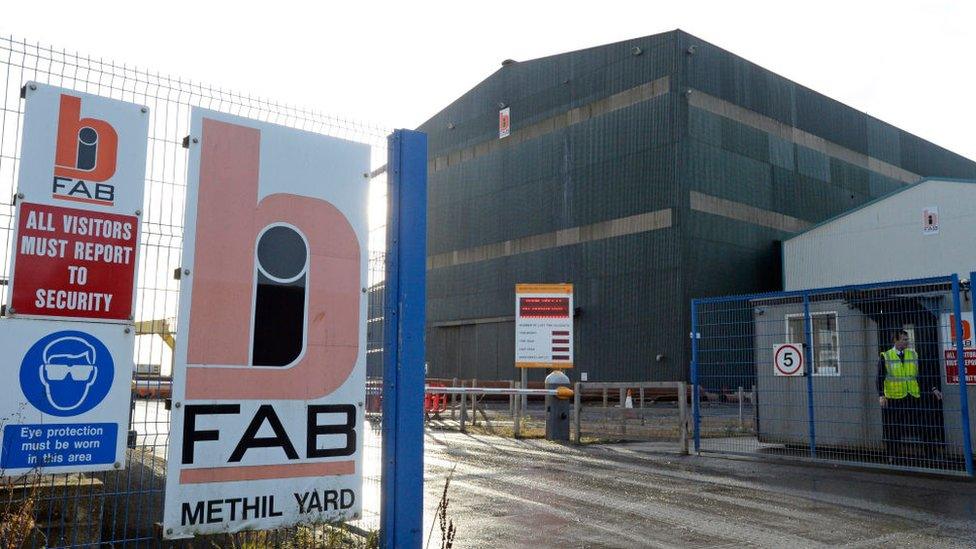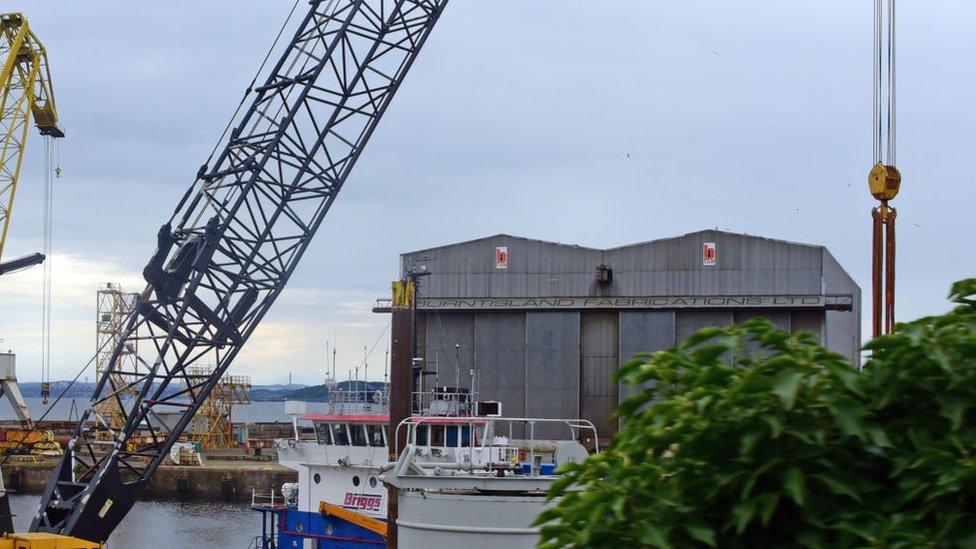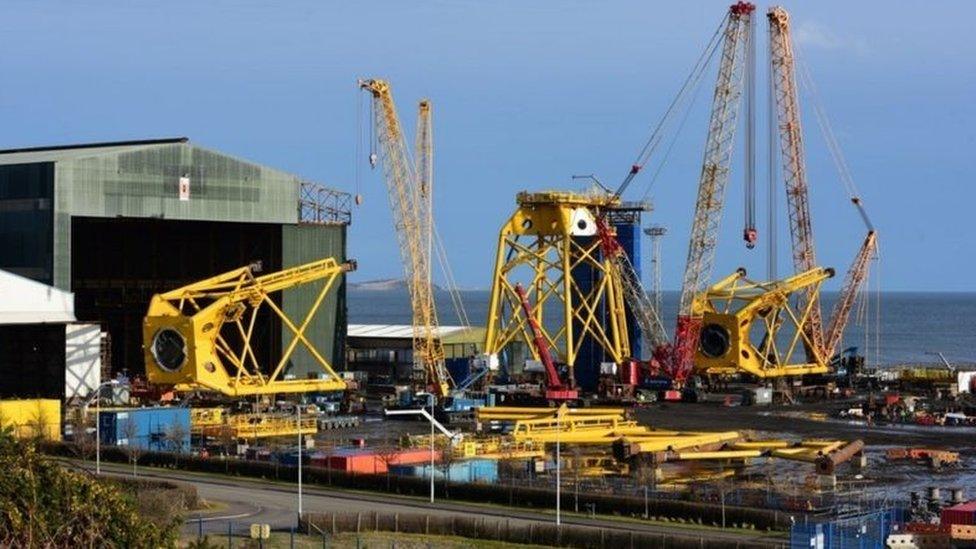Engineering firm BiFab goes into administration
- Published

Struggling engineering firm BiFab has been put into administration after failing to secure any new contracts.
It comes despite the firm, which has plants in Fife and Lewis, receiving £52m from the Scottish government.
However, BiFab said it had been unable to compete with yards owned or subsidised by governments in and outside the EU.
The firm had been seen as the best hope for offshore wind manufacturing in Scotland.
In a statement, the firm said: "BiFab can confirm that the board has agreed to place the company in administration following the Scottish government's decision to remove contract assurances.
"The company has worked tirelessly to bring jobs into Fife and Lewis with some success.
"However, the absence of supply chain protections in Scotland and the wider UK have consistently undermined our ability to compete with government-owned and government-supported yards outside and inside the European Union.
"We would urge the Scottish and UK governments to address these structural challenges as a matter of urgency in order to ensure that the benefits of offshore renewables are shared more widely with communities across the country."

The steel fabrication firm, which has yards in Methil and Burntisland in Fife, and Lewis, was rescued by the Scottish government in 2017 and was acquired by Canada-based JV Driver the following year, with the company believing the Scottish government would be the "primary financiers".
However, a £2bn deal to manufacture eight wind turbine jackets at its yards in Methil as part of the Neart Na Gaoithe (NnG) project collapsed last month, and the UK and Scottish governments said they had no legal route to provide further financial support to the company.
'Left with industrial ruins'
A joint statement by trade unions GMB Scotland and Unite said BiFab's administration exposed the "myth of Scotland's renewables revolution as well as a decade of political hypocrisy and failure, in Scotland and the rest of the UK."
GMB Scotland secretary Gary Smith and Unite Scotland secretary Pat Rafferty added that the workers and communities dependent on the yards had "fought so hard for a future".
"Shamefully the Scottish government has buried these hopes just in time for Christmas and they have worked together with UK government in doing so," they said.
"A decade on from the promise of a 'Saudi Arabia of renewables' and 28,000 full time jobs in offshore wind manufacturing, we've been left with industrial ruins in Fife and Lewis."

Economy Secretary Fiona Hyslop said the Scottish government had worked for more than three years to support BiFab and remained committed to securing a future for the yards and the workforce.
She acknowledged that it was "extremely worrying" for workers and said the government would continue to do everything possible to support them.
She added that as a minority shareholder, the Scottish government had been "exhaustive" in its considerations of support options and said there was no legal route for either the Scottish or UK governments to provide further financial support.
"In order to successfully secure and deliver new contracts, BiFab required working capital, the provision of appropriate assurance packages by the shareholders, and plans for investment at the sites," she said. "Despite commitments made at the time of acquisition, this is something the majority shareholder JV Driver was not willing to provide to secure future work."
At First Minister's Questions, Nicola Sturgeon said she "deeply regretted" and was "deeply disappointed" by the developments.
"We were not able to legally provide the additional support BiFab was seeking," she said. "Had the majority shareholder been prepared to invest, that may have been different."


The best that can be said of BiFab going bust is that few workers stand to lose their jobs, as the yards have spent three years getting little more than necessary maintenance.
So not many hurt? Well, this goes much deeper than immediate job losses, and beyond 400-plus jobs that could have come from the contract it won.
The yards are totemic: they have been a vital sign that Scotland could gain from manufacturing for the green energy revolution. Without factories to build turbines or towers, though they were promised, there's now little prospect for steel fabrication - one product Scots made well for the offshore oil industry. If there was a strategy, it failed, repeatedly.
For platforms and turbines to be located off the coast of Fife, Angus and Aberdeenshire, it's cheaper to build in Asia, the Middle East and Spain. Scottish yards lacked the government support and subsidy that their rivals get. But that's too easy an excuse. They also lack the scale and efficiency of competitors, which required investment - public, private or both.
So what's being done about that? We're due to get a new manufacturing strategy from the Scottish government, imminently. The UK government has been talking about industrial strategy, with its focus on the north of England. Both will have a lot of heavy lifting to do if they're to raise the Scottish and UK game in industrial competitiveness.

Last week, BiFab said the Canadian owner had repeatedly offered to offload shares to the government at no cost. It said this would give the Scottish government - which owns a third of the company - more flexibility to back it.
It said ministers' statements about it had been inaccurate or untruthful and JV Driver had agreed to become involved on the understanding that ministers would provide most of the finance required to win new contracts.
A joint working group has been set up with the UK government to explore how existing policy measures can be used to strengthen the renewables and clean energy supply chain in Scotland.
On Wednesday, MSPs voted to "condemn" the Scottish government's decision to withdraw financial guarantees and to call on them to "act now to secure the future" of the yards.
The motion, which was passed by 61-60, said the government was "risking Scotland's reputation as a green investment hub".
'Sorry saga'
STUC general secretary Roz Foyer said the announcement was the latest stage in a "sorry saga of government and corporate failure with the victims being workers and their families from Fife to the Islands".
Scottish Greens energy spokesman Mark Ruskell said the news showed a "major dereliction of the Scottish government's duties on jobs and a green recovery" and made "a mockery" of their claims to have saved BiFab eight months ago.
Scottish Labour economy spokesman Alex Rowley said: "This terrible news will come as a hammer blow to workers across Scotland and exposes the fraud that is the SNP's claims of a renewables revolution."
Scottish Liberal Democrat leader Willie Rennie said: "The SNP government's incompetence has left an industrial wasteland. This was a golden opportunity to connect our battle against climate change with jobs in industrial communities across the country, but the government has wasted over £52m creating a couple of hundred temporary jobs."
- Published27 November 2020

- Published24 November 2020

- Published2 November 2020
- Published3 November 2020
